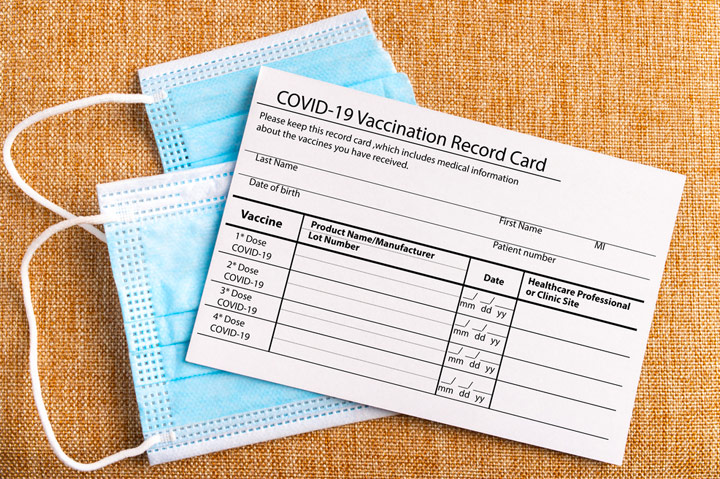December 08, 2021
Judge Orders Halt of Vaccination Mandate for Federal Contractors
The mandate from the Biden administration affects millions of workers, including those in the promo products industry.
A federal judge has temporarily stopped President Joe Biden’s COVID-19 vaccination mandate for federal contractors, a ruling with relevance for businesses in the promotional products industry that are contractors and/or subcontractors to any entity of the United States government.
On Tuesday, Dec. 7, Judge R. Stan Baker of the U.S. District Court for the Southern District of Georgia issued an order that temporarily halts implementation of the mandate across the entire nation – “in all covered contracts in any state or territory of the United States of America.”

In so doing, Baker ruled that Associated Builders and Contractors, a national trade group that challenged the president’s mandate, is on solid legal ground in its assertion that the president exceeded his authority under the Procurement Act when he issued the vaccination order.
Baker opined that the mandate is “costly, laborious and likely to result in a reduction in available members of the workforce.”
Baker further stated: “In its practical application, (the mandate) operates as a regulation of public health. It will also have a major impact on the economy at large, as it limits contractors’ and members of the workforce’s ability to perform work on federal contracts. Accordingly, it appears to have vast economic and political significance.”
Whether or not the mandate will ultimately be implemented or permanently stopped will be the subject of a subsequent court battle.
Promo products companies – and other firms that are federal contractors/subcontractors – will have to decide whether to proceed currently as if the mandate were going to take effect or wait and see if the courts OK it before moving forward. The administration has issued guidelines for those that plan to conform to the mandate.
White House press secretary Jen Psaki vowed that the Justice Department will “vigorously defend” the mandate in court.
“The reason that we proposed these requirements is that we know they work and we are confident in our ability legally to make these happen across the country,” Psaki said.
In September, Biden issued a mandate that employees of federal contractors and subcontractors must be vaccinated against COVID-19 or their employers would risk the termination of their contracts with agencies and departments of the United States government. The mandate effects millions of workers.
Initially, Biden set Dec. 8 as the day for conforming to the requirement, before later changing the deadline to Jan. 4, 2022.
The temporary halt on the vaccination mandate for federal contractors is the latest in a series of setbacks for the Biden administration in its efforts to establish vaccination requirements for broad swaths of the American population.
On Friday Nov. 12, a federal court affirmed its earlier decision to temporarily halt the implementation of a Biden mandate that requires workers at companies with 100 or more employees in the United States to be fully vaccinated against COVID-19 by Jan. 4, 2022, or to submit to weekly coronavirus tests to confirm they don’t have the virus.
Following that ruling, the Occupational Safety and Health Administration (OSHA) suspended any steps toward enforcing the mandate. The Biden administration has appealed the halt order, but it remained in place as of this writing.
A new front has opened in the court battles over a federal vaccination mandate for larger employers. https://t.co/Ir4vJgXTTz @ASI_MBell @asicentral
— Chris Ruvo (@ChrisR_ASI) November 23, 2021
Last month, a federal judge in St. Louis slammed the brakes on Biden’s vaccination mandate for medical workers, ruling that “Congress did not clearly authorize [the Centers for Medicare and Medicaid Services] to enact this politically and economically vast, federalism-altering, and boundary-pushing mandate, which Supreme Court precedent requires.”
Meanwhile, the Senate voted on Wednesday, Dec. 8, to nullify the vaccination/testing standard for employers with 100 or more employees. Still, the passage might end up being just symbolic. For it to take effect, the House of Representatives would also have to approve it, and there’s uncertainty that would occur given Democrats’ stronger majority in the House than in the Senate. Biden would also have to sign the measure, which the administration says he wouldn’t do.
“If it comes to the president’s desk, he will veto it,” Psaki said.
She added: “Our view and the view of many Americans is that if people aren’t vaccinated, having them test once a week is quite reasonable as we’re thinking about how to protect our workplaces, how to protect stores and retail locations as people are out shopping for Christmas and the holidays, how to protect schools and public places. And we also know that more than 100 leading public health experts have endorsed this rule.”
This week, New York City’s Democratic Mayor Bill de Blasio announced a vaccination mandate for private sector employers. It’s facing legal challenges.
